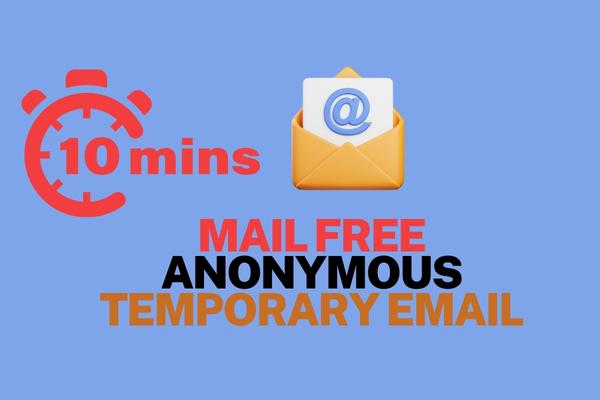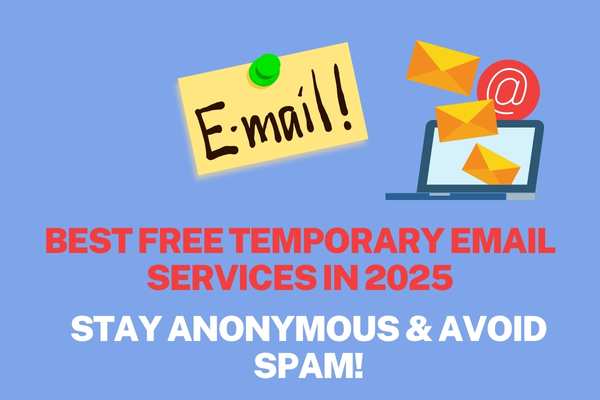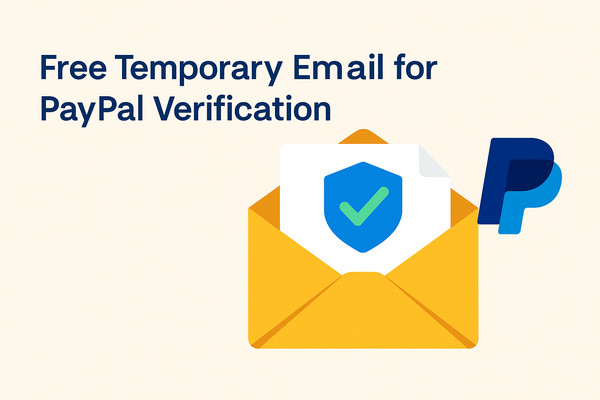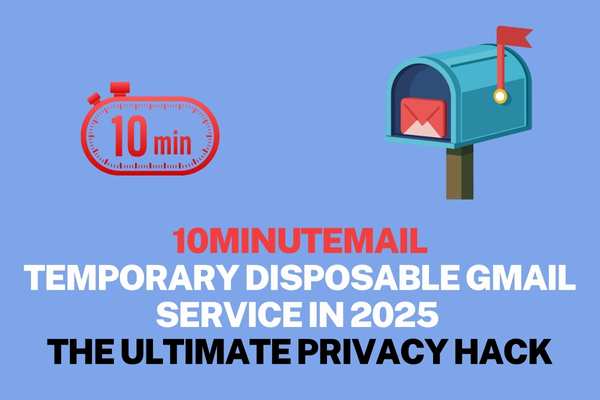6 Best Disposable Temporary Mail Services for 2025

Disposable Temporary Mail Services
What Are Disposable Temporary Mail Services?
Ever landed on a website and been asked for your email before you could see anything? That’s where Disposable Temporary Mail Services come in handy. These are temporary email addresses that you can use to receive messages for a short time—perfect for signing up without committing your personal inbox to a lifetime of spam.
Disposable email services generate a random email address that you can use immediately. No registration, no password, and best of all—no risk of your primary email being bombarded with ads or phishing attempts. In a digital world overloaded with pop-ups, newsletters, and unsolicited offers, these services are like throwaway shields for your inbox.
By 2025, as concerns about digital privacy and data mining grow louder, these services are evolving fast. From simple no-login solutions to encrypted and privacy-focused platforms, temporary email tools are becoming a necessary part of smart online browsing.
Why Do People Use Temporary Emails in 2025?
The digital landscape in 2025 is more complex than ever. With new AI-powered marketing tools and data tracking technologies, your inbox is constantly at risk of being targeted. That’s why more users now turn to disposable emails—not just for convenience, but for self-defense.
Some use cases include:
-
Signing up for free trials without the fear of endless follow-up emails.
-
Registering on shady websites or forums just to download a resource.
-
Avoiding spam while participating in contests, surveys, or giveaways.
-
Testing software or email workflows without polluting their actual inbox.
In a world where your email is your digital identity, having a temporary alias lets you explore the web with freedom. For anyone concerned with digital hygiene, these tools are no longer optional—they’re essential.
Benefits of Using Disposable Temporary Mail Services
Enhancing Online Privacy
Imagine walking around with your home address printed on your shirt. That’s what using your real email feels like in many corners of the internet. Every site you sign up for could potentially leak, sell, or misuse your data. Temporary emails act like a virtual mask, keeping your real identity hidden from prying eyes.
With more people being hacked and personal data being exposed through breaches, privacy-conscious users are taking back control. Disposable emails reduce your digital footprint. You’re not sharing your real email, which can’t be traced back easily. You won’t show up in marketing databases or third-party ad campaigns.
Some services even provide IP masking, HTTPS encryption, and auto-deletion of emails, adding another layer of anonymity. In 2025, these features are particularly useful as people face constant digital surveillance and AI-driven profiling.
Avoiding Spam and Promotional Emails
Let’s be honest—no one likes spam. That one email you gave to access a discount coupon? It’s now turned into ten promotional emails a day. And unsubscribing doesn’t always help—some brands just keep coming back.
By using a disposable email, you cut off the spam before it even starts. You get what you want (the free trial, download, or discount), and then walk away clean. It’s the digital equivalent of using a burner phone.
For instance, signing up for newsletters just to access gated content is common. You don’t want to use your real email, yet you still need the content. That’s the perfect use case for a temporary inbox. Best part? When you’re done, the email address ceases to exist—no spam follow-ups.
How to Choose the Best Temporary Mail Service in 2025
Key Features to Consider
Not all disposable email services are built the same. Some are fast but lack privacy. Others are secure but may limit how long your email lives. Here’s what to look for:
-
Ease of use: Can you get an email with one click?
-
No registration required: The less you share, the better.
-
Email lifespan: Some expire in 10 Minute Mail; others last days.
-
Attachment support: Crucial if you’re expecting downloads.
-
Spam filtering: Keeps unwanted emails out of your temporary inbox.
-
Security features: SSL encryption, IP masking, and no tracking.
-
Custom email names: Useful if you want something memorable.
In 2025, where phishing scams and data leaks are at an all-time high, it’s not just about convenience. The best service should make your temporary email usage feel just as safe as your primary inbox.
Free vs. Paid Services
Most users opt for free disposable emails, and they’re fine for basic needs. But if you want advanced features like longer storage, custom domains, or encrypted messaging, a paid plan might be worth it.
Here’s a quick breakdown:
| Feature | Free Plans | Paid Plans |
|---|---|---|
| Email Lifespan | 10 minutes – 1 day | Up to 30 days or permanent |
| Attachment Support | Often limited | Usually included |
| Custom Domains | Rare | Often available |
| Encryption | Basic SSL | Advanced end-to-end encryption |
| Ads | Present | Ad-free experience |
Think of it like this: if you’re a casual user, free options will do. But if you handle sensitive data, or just hate ads, investing a few bucks can upgrade your experience massively.
1. Temp Mail – Fast and User-Friendly
Key Features of Temp Mail
Temp Mail is arguably the most recognizable name in the disposable email world. With a sleek interface and instant email generation, it makes the whole process seamless. You visit the site, and boom—you’ve got a random email ready to use.
Here’s what makes it shine in 2025:
-
Auto-generates an inbox the moment you land on the site.
-
Supports attachments, so it’s not just for text-based verification.
-
Mobile app available for both Android and iOS.
-
Browser extensions to integrate it directly into your workflow.
-
Dark mode, for the late-night privacy freaks out there.
Temp Mail also supports multiple domains, so you can pick an address that looks more “normal” to the site you’re signing up for. It’s lightning fast and gets the job done with zero effort on your part.
Pros and Cons
Pros:
-
No sign-up needed
-
Instant access
-
Cross-platform compatibility
-
Good for quick tasks
Cons:
-
Emails auto-delete quickly (unless you pay)
-
Limited customization
Temp Mail is perfect for everyday users who just want to protect their inbox without diving too deep into settings or features.
2. 10 Minute Mail – Quick & Secure Option
How It Works
As the name suggests, 10 Minute Mail gives you a disposable email address that lasts exactly ten minutes. Need more time? You can extend it manually in 10-minute increments. It’s simple, effective, and zero-hassle.
No frills, no setup—just visit the site and your inbox is ready. You can receive emails instantly, and in most cases, verify accounts or download files before the clock runs out. If you need a little more time, hit the refresh icon and you get another 10 Minute Mail.
This makes 10 Minute Mail a solid choice when you know your use case is going to be super short-lived—like accessing a resource, confirming an account, or testing an email system.
2. 10 Minute Mail – Quick & Secure Option
Advantages for Short-Term Use
10 Minute Mail is perfect when time is of the essence. It’s one of the fastest services available, and its simple interface means there’s no learning curve. For anyone who needs a one-and-done email—like signing up for a new app, retrieving a coupon, or confirming an account—this service is a dream.
Why people love it in 2025:
-
No ads or clutter, giving a clean user experience.
-
One-click extend feature, which helps when you need a bit more time.
-
High-speed servers that receive emails almost instantly.
-
Reliable security with SSL encryption built-in.
It’s also lightweight and doesn’t store your personal info. No cookies, no trackers, just pure utility. Whether you’re a developer running quick tests or a casual user protecting your identity, 10 Minute Mail is one of the top choices out there.
The only downside? It’s not suitable for anything long-term. If your verification process takes more than 10–20 minutes, you might be better off with another service.
3. Guerrilla Mail – The Veteran in the Field
Unique Features of Guerrilla Mail
Guerrilla Mail has been around longer than most temporary email services, and for good reason. It’s open source, customizable, and offers one of the most robust sets of features for privacy-first users.
What makes Guerrilla Mail stand out in 2025?
-
Email address creation with custom usernames—no random gibberish unless you want it.
-
Encrypted HTTPS interface to keep your browsing private.
-
Option to send anonymous emails, which is rare in the disposable email world.
-
Open-source transparency, so tech-savvy users can verify security.
-
Email history, allowing messages to persist for a few hours.
For users who want more control over their temporary inbox, Guerrilla Mail is the clear winner. It’s more technical, sure, but with that complexity comes power.
When to Use Guerrilla Mail
Guerrilla Mail is ideal when:
-
You’re doing testing that requires sending as well as receiving emails.
-
You need temporary inboxes for longer than 10 Minute Mail.
-
You want to track multiple signups using your custom inbox names.
-
You’re concerned about surveillance and want open-source accountability.
It’s not the prettiest platform, but what it lacks in beauty it makes up for in functionality. For developers, testers, and privacy nerds, Guerrilla Mail continues to be a top-tier option.
4. EmailOnDeck – Reliable and Accessible
User Interface and Accessibility
EmailOnDeck hits the sweet spot between usability and privacy. It’s incredibly fast and doesn’t require any registration, but it also gives you a sleek, modern interface that’s easy to navigate—even for first-time users.
Standout features in 2025:
-
Fast two-step setup—prove you’re not a robot, then get your email.
-
Secure inbox that loads emails in real time.
-
Works on mobile and desktop with no lag.
-
Clean UI makes it beginner-friendly.
EmailOnDeck is also known for its email verification reliability. You’ll rarely run into delivery issues, making it great for signing up for services where timing and confirmation are crucial.
Use Cases for Professionals
Unlike some other services aimed at casual users, EmailOnDeck finds favor with freelancers, digital marketers, and small business owners. Here’s why:
-
Testing client email workflows without polluting real inboxes.
-
Avoiding email scraping when creating temporary profiles.
-
Managing multiple campaigns or accounts with ease.
If you’re someone who often creates throwaway accounts for work purposes, EmailOnDeck gives you a reliable, quick, and secure environment to do it in.
5. Maildrop – Clean and Efficient
Spam Filtering Abilities
Maildrop was built with spam in mind. It has one of the best spam filtering systems among free temporary email services. If you’re constantly using disposable emails but still want some cleanliness in your inbox, this one’s a great choice.
Key features in 2025:
-
Powerful spam filters that eliminate junk before it clogs your inbox.
-
No sign-up required, yet provides consistent performance.
-
Public inboxes with optional usernames.
-
Minimalist design for fast access and use.
It’s particularly good for users who frequently sign up for services that might send shady or excessive emails. Maildrop catches them and keeps your inbox looking neat.
Why It’s Ideal for Casual Use
Maildrop works well if:
-
You don’t need attachments.
-
You’re using it for newsletters or giveaways.
-
You want your email to be somewhat recognizable (like john@maildrop.cc).
Just remember: it’s not encrypted, and since inboxes are public (if the name is guessed), it’s not suitable for sensitive tasks. But for signing up to blogs, downloading eBooks, or joining free trials? Maildrop is more than enough.
6. AnonAddy – Privacy-Focused Disposable Email
Open Source and Privacy Perks
AnonAddy isn’t your average temporary mail service—it’s a full-blown email aliasing solution built with privacy at its core. While technically not “disposable” in the same way as 10 Minute Mail, it offers much deeper functionality for users who want long-term control without revealing their true identity.
Top features in 2025:
-
Open source and self-hostable, for those who want full control.
-
Create unlimited aliases to mask your real email address.
-
Send and reply anonymously, without ever exposing your real inbox.
-
GPG encryption, adding another layer of security.
-
Premium tier allows custom domains and extra storage.
AnonAddy is like the Swiss Army knife of email privacy—it might not be the fastest, but it’s one of the most powerful.
Integration With Email Clients
You can link AnonAddy with your existing inbox and it forwards emails without exposing your actual address. It also allows you to reply to emails without giving yourself away, which is extremely useful for professional communication, journalist inquiries, or activist work.
Who should use AnonAddy?
-
Privacy advocates
-
Journalists and whistleblowers
-
Developers and open-source enthusiasts
-
Anyone tired of being tracked online
It’s not the quickest setup, but once configured, it becomes a privacy shield that works silently in the background—perfect for 2025’s hyper-connected and often invasive online world.
Comparing the Top 6 Temporary Mail Services
Feature Comparison Table
With so many excellent disposable email services available in 2025, it can be tough to pick the right one. Here’s a detailed comparison table to help you understand the strengths and weaknesses of each.
| Feature | Temp Mail | 10 Minute Mail | Guerrilla Mail | EmailOnDeck | Maildrop | AnonAddy |
|---|---|---|---|---|---|---|
| Requires Signup | ❌ | ❌ | ❌ | ❌ | ❌ | ✅ (Basic Plan) |
| Lifespan | Varies | 10 mins | 1 hour+ | Short-term | Unlimited (public) | Long-term |
| Custom Username | ❌ | ❌ | ✅ | ❌ | ✅ | ✅ |
| Attachment Support | ✅ | ✅ | ✅ | ✅ | ❌ | ✅ |
| Mobile App | ✅ | ❌ | ❌ | ❌ | ❌ | ✅ |
| Encrypted Emails | ❌ | ❌ | ✅ | ✅ | ❌ | ✅ |
| Ad-Free | ❌ | ✅ | ✅ | ✅ | ✅ | ✅ |
| Can Send Emails | ❌ | ❌ | ✅ | ❌ | ❌ | ✅ |
| Best For | General use | Quick tasks | Advanced users | Professional use | Basic signups | Privacy-focused |
This table makes it easier to select the tool that best fits your needs. Whether you value speed, anonymity, or customization, there’s a solution that’s right for you.
Best Use Case for Each Service
-
Temp Mail: Ideal for those who want a quick, no-fuss email to access content or sign up for an app.
-
10 Minute Mail: Best for one-off use cases where speed and minimal effort matter most.
-
Guerrilla Mail: Excellent for developers, testers, or users who need more features and anonymity.
-
EmailOnDeck: Suitable for professionals managing multiple temp signups or email tests.
-
Maildrop: Great for casual users who want to avoid spam without any technical know-how.
-
AnonAddy: A must-have for privacy fanatics and anyone who wants long-term, alias-based inbox masking.
Risks and Limitations of Disposable Email Services
Security and Reliability Concerns
While disposable email services are convenient, they come with a few risks. Most notably, security is not guaranteed on free platforms. Since many services don’t use two-factor authentication or end-to-end encryption, your temporary emails may be more vulnerable to interception.
Also, the short lifespan of these inboxes can be problematic. If you’re verifying an account and the email doesn’t arrive in time—or worse, the temp address expires—you may lose access altogether. And let’s not forget, public inboxes like Maildrop can be accessed by anyone who guesses the right alias.
Other limitations include:
-
No recovery options if you lose access.
-
Limited storage for attachments or large files.
-
Potential for data harvesting on shady platforms.
-
Not accepted by all websites, especially more secure platforms.
It’s also worth mentioning that emails stored in temp inboxes might be scanned or logged for analytics, especially on ad-supported platforms. Always avoid sharing sensitive personal or financial information through these services.
Potential Legal or Ethical Issues
Using temporary email services can occasionally raise eyebrows, especially in professional or legal contexts. While they’re perfectly legal in most jurisdictions, misusing them to deceive, impersonate, or defraud others can quickly cross ethical lines.
For instance:
-
Signing up for multiple free trial accounts using fake emails might violate terms of service.
-
Participating in surveys or contests with temp emails could be considered dishonest.
-
Using disposable emails for phishing, scams, or identity spoofing is outright illegal.
Bottom line: these tools are best used for protecting your privacy, not exploiting systems. Stay ethical, and you won’t run into issues.
Use Cases for Disposable Emails in 2025
Account Verification and One-Time Signups
Temporary email services thrive in scenarios where you just need to get in, get what you need, and get out. Here are some prime examples of how people are using them in 2025:
-
Downloading gated PDFs or eBooks without signing up for a mailing list.
-
Registering for events, webinars, or contests that require email confirmation.
-
Joining a platform for a one-time task (like accessing a forum or posting a job listing).
-
Bypassing paywalls that only require an email to start a free trial.
Many platforms now use email gating to access content. If you’re not interested in long-term communication, using a disposable address gives you access without committing your primary inbox.
This use case is especially popular with marketers and freelancers who need to sign up for dozens of platforms or tools in short bursts without cluttering their work emails.
Beta Testing and Development
Developers and QA teams love temporary emails for one reason: test, test, and test again.
Imagine you’re building a SaaS platform and need to test 100 user registrations. Do you create 100 Gmail accounts? Of course not. You use disposable emails.
Here’s how they help:
-
Testing sign-up workflows without clogging your main inbox.
-
Simulating email notifications or onboarding sequences.
-
Verifying that your email sending system works across domains.
-
Checking spam scores by sending to different temp addresses.
For anyone in development or digital product management, temporary email services are an essential part of the toolkit.
Read More:-
- What is 10 Minute Mail: Disposable Temporary Email Service
- Temp 10Mail Mobile Free – The Ultimate Guide to Temporary Email Services on Mobile Devices
- Best Temporary Email Generator Free #1 – The Ultimate Guide to Anonymous, Disposable Email Services
Best Practices When Using Disposable Emails
When to Use Them vs. When Not To
Yes, disposable email services are powerful. But that doesn’t mean they’re the right tool for every job.
Use them when:
-
Signing up for a one-time offer or download.
-
Testing online tools or workflows.
-
Registering on forums you don’t trust.
-
You want to avoid spam and junk in your primary inbox.
Avoid them when:
-
You’re signing up for banking or government services.
-
You need to receive follow-up emails over several days.
-
You want to reset a password later.
-
You’re applying for jobs or communicating with clients.
Disposable doesn’t mean reliable. These emails are best used like paper towels—handy in the moment, but not something you want to depend on long-term.
Managing Multiple Email Identities
If you’re juggling multiple personas online—say, one for work, one for newsletters, one for testing—then disposable email addresses can help, but it’s worth doing so methodically.
Here are a few tips:
-
Use browser extensions like the Temp Mail or Guerrilla Mail add-ons for quick access.
-
Use a password manager to log which disposable email you used for which service.
-
Consider using alias tools like AnonAddy or SimpleLogin if you want more control.
The key is balance: keep your real inbox clean, use disposables strategically, and don’t forget to log important credentials in case you ever need to revisit a temp account.
Conclusion: Which Temporary Email Service is Best for You?
By now, you’ve seen just how varied and powerful disposable email services can be in 2025. Whether you’re a developer, a digital nomad, or just someone sick of spam, there’s a solution tailored to your needs.
-
Go for Temp Mail or 10 Minute Mail if you want fast, no-fuss access.
-
Choose Guerrilla Mail or EmailOnDeck if you need more power and control.
-
Pick Maildrop for lightweight tasks and spam avoidance.
-
Opt for AnonAddy if you’re serious about privacy and data protection.
These tools are no longer just “nice to have”—they’re must-haves in an era where inbox control equals peace of mind. Use them wisely, ethically, and strategically, and you’ll be ahead of the curve in protecting your digital presence.
FAQs
Are temporary email addresses traceable?
Most are hard to trace back to a real person, especially if you don’t provide identifying information. However, some services may log your IP address, so use a VPN for extra privacy.
Can I receive attachments on disposable emails?
Yes, but not all services support this. Temp Mail, Guerrilla Mail, and AnonAddy offer attachment support, while Maildrop doesn’t.
Are these services legal to use?
Yes, they are legal in most countries. Just don’t use them for fraudulent or illegal activities, or to violate terms of service on websites.
Can I use a disposable email for social media?
It depends on the platform. Some sites block temporary domains, while others allow it. For long-term access, use alias services like AnonAddy instead.
What’s the difference between temporary and alias emails?
Temporary emails are meant for short-term use and usually self-destruct. Alias emails like AnonAddy forward messages to your real inbox and can be reused or deleted anytime.





